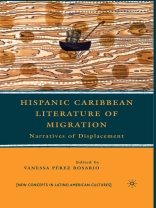This collection explores the literary tradition of Caribbean Latino literature written in the U.S. beginning with José Martí and concluding with 2008 Pulitzer Prize winning novelist, Junot Díaz. The contributors consider the way that spatial migration in literature serves as a metaphor for gender, sexuality, racial, identity, linguistic, and national migrations.
Inhoudsopgave
PART I: MIGRATORY IDENTITIES The Unbreakable Voice in a Minor Language: Following José Martí’s Migratory Routes; L.Lomas Más que Cenizas : An Analysis of Juan Bosch’s Dissident Narration of Dominicanidad (Ausente); L.García Peña Creating Latinidad : Julia de Burgos’ Legacy in U.S. Latina Literature; V.Pérez Rosario PART II: DISLOCATED NARRATIVES Travel and Family in Julia Alvarez’s Canon; V.Nun Halloran Making it Home: A New Ethics of Immigration in Junot Díaz’s Drown; Y.Irizarry Days of Awe and the Jewish Experience of a Cuban Exile: The Case of Achy Obejas; C.Wolfenzon-Niego PART III: GENDER CROSSINGS A Community in Transit: The Performative Gestures of Manuel Ramos Otero’s Narrative Triptych; M.Llado Ortega A Revolution in Pink: Cuban Queer Literature Inside and Outside the Island; A.B.M.Sevillano Gender Pirates on the Caribbean Sea: Queering Gender, Race, and Diaspora in the Novels of Christopher John Farley and Zoe Valdés; O.N.Tinsley PART IV: RACIAL MIGRATIONS Insular Interventions: Jesús Colón Unmasks Racial Harmonizing and Populist Uplift Discourses in Puerto Rico; M.Stanchich Coloniality of Diasporas: Racialization of Negropolitans and Nuyoricans in Paris and New York; Y.Martínez-San Miguel The Dominican Diaspora Talks Back: Cultural Archive and Race in Junot Díaz’s The Brief Wonderful Life of Oscar Wao ; J.Heredia
Over de auteur
VANESSA PÉREZ ROSARIO is Assistant Professor of Puerto Rican and Latino Studies at The City University of New York – Brooklyn College, USA.











